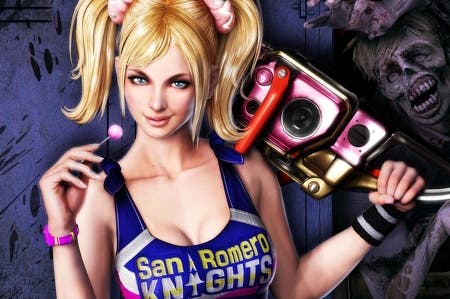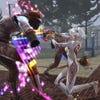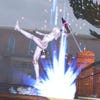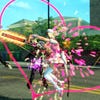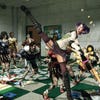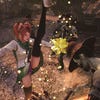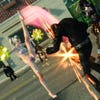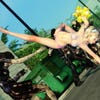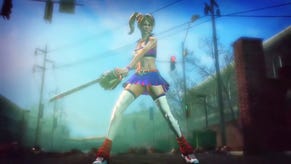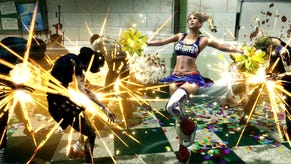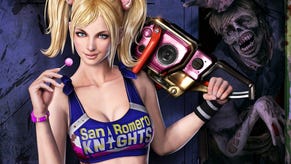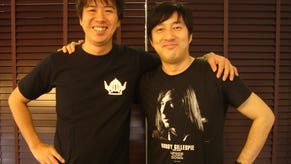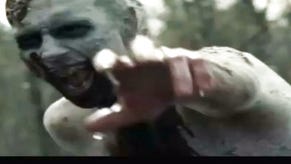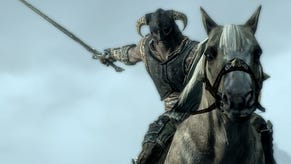Lollipop Chainsaw Review
2! 4! 6/10!
Desperate to fall in love with Lollipop Chainsaw? Or perhaps itching to be disgusted by it? Bad news, I'm afraid: either way, you're going to leave a little disappointed.
If you're waiting for a scrappy B-movie classic to emerge - as Grasshopper's taste for bizarro Americana and broad-strokes irony combines with delirious, sugary zombie slaughter - you'll be let down by a game that's short, repetitive, and a little too imprecise where it counts.
Meanwhile, if you're looking for a new low when it comes to casual misogyny and the objectification of women, you're likely to end up confused as regularly as you are outraged. Juliet Starling certainly looks the part and the game never shies away from sending its leering camera in a touch too close, but the script delivers characterisation with just a touch more substance than you might expect. Is this a satire of exploitation or an indulgence? I have a feeling it's trying to be both.
It's typical Suda 51 stuff: a muddle of pop culture nods, scattershot puns and antic gore. The set-up is pure Buffy, as Juliet Starling admits to her - sadly decapitated - boyfriend Nick that she's a secret zombie slayer as well as a star cheerleader. With the undead spilling into town in unprecedented numbers, the stage is set for a weirdly romantic action game. The couple - Juliet keeps Nick's head on a keychain tagged to her belt - bicker and flirt while she hands out gas-powered justice with a tree surgeon's favourite accessory, and he gets dropped onto headless zombies for the occasional rhythm action mini-game, or swings by in special attacks.
Visually, Lollipop Chainsaw is appealingly ropey, with blurry, fairly simplistic assets, naff physics, and only Starling's astonishing animation standing out as she dispatches ghouls with star-jumps and spinning head-stand kicks. In its corner-cutting and jerry-rigging, it feels like a true punk aesthetic. A little light cel-shading and handfuls of quirky, colourful effects do much to disguise the cheapness of the production.
It's the script that provides most of the real charm, however, drawing its lovesick leads with surprising bite, and offering everyone a selection of decent lines as the adventure rattles along. Juliet is smart, breezy and confident, yet quietly prudish with it on occasion. Riddled with convincing quirks and warm humour, she's also surrounded by a supermodel rockabilly family that's every bit as engagingly nutty. Meanwhile, Nick is both a straight man to Juliet and the stand-in for the befuddled audience: Zombie farmers? Zombie quarterbacks? What's happened to San Romero?
In a weird sort of way - even though it's set knee-sock-deep in rotting gristle and twinkling multiplier scores - it's a far more convincing depiction of a relationship than you expect from a video game. What's more, Starling gets a thoughtful characterisation than goes beyond what most heroines could hope for. It's a bit annoying, then, that the game's always trying to disappear up her skirt or down her top, that other characters can't stop calling her a whore, and that the camera lingers and ogles whenever it gets a chance.
It's true that most of the men you come across are pathetic freaks, and everyone else is a zombie waiting to be chainsawed into pieces. That doesn't really counter the perviness, though, and for much of the running time the script seems peculiarly at odds with the sweaty visual presentation. Between Starling's youthful, fairly wholesome energy and some of the grottier intentions of the cut-scene direction, you get an uncomfortable blend of elements that comes off, well, a little like cheerleading can when it's out of the sports stadium and splashed across the internet.
On the battlefield, Lollipop Chainsaw is equally divided. There's something deeply brilliant about the way Starling uses her cheer skills in such gruesome combat - hopping over baddies, backflipping between roundhouses and performing chants after a particularly memorable decapitation. Be warned, though - such characterful animation is tied to a brawling system that's knockabout fun, perhaps, but is lacking much in the way of real flair.
It's a smart idea to offer light and heavy attacks in the form of a kind of weaponised pom-pom display that stuns foes and chainsaw lunges that can then efficiently decapitate them - and that good ol' fighting game hit-pause is as reliably motivating as ever. Yet the new moves you unlock don't deliver that many interesting twists on the basic hacking and slashing, while the asides offered up often make things worse.
The Chainsaw Dash, in which Starling turns into a flesh-shredding freight train, is used only for a handful of fast-paced traversal sections and provides little sense of impact when you actually collide with an enemy. The Chainsaw Blaster you receive fairly early on in the game comes with horrible aim and similarly poor feedback. Star Soul mode at least sees you releasing any built-up rage with a blast of super-violence accompanied by the new-wave classic Hey Mickey, though, so it's not all bad news by any means. That guy really is so fine, you know?
Enemies make things a little more interesting, whether they're zombie sportsmen, breakdancers lugging around perk-providing stereos, flame-breathing firemen or even fellow cheerleaders, hopping about in decaying jerseys and performing wobbly handstands as they wave their bleeding ankle stumps in the air. Beyond that, the game attempts to vary the pace with rescue missions, escape sequences, and a handful of button-matching mini-games, while working in a series of endearingly blunt references to arcades, the farming belt and organised sports.
Lollipop's best idea is probably the Sparkle Hunting system that rewards you with bonuses if you can kill more than three zombies with a single swipe of the chainsaw. It takes the standard trudge of battle and gives it a kind of spatial, puzzle-y feel that's entirely welcome. Its worst ideas are almost certainly the tedious, gimmicky bosses, always ready to come back from the brink for one last pun or one last health bar recharge. (I'll forgive the zombie DJ guy, however, for his autotuned speech. Also, he has his own UFO, and I respect that.)
It all makes for an oddball game that struggles to be odd in the right way. Despite the clever, if patchy, script and some great performances - Michael Rosenbaum from Smallville is particularly good as Nick - there just isn't enough fun lurking in the combat to keep you entertained when a level goes on a bit longer than it should, when an extended joke or homage isn't quite witty enough to earn its keep, when the upgrade shop isn't filled with anything you'd really want to buy, and when the tone descends into damp sleaze. Grasshopper's latest really is a bit of a lollipop: it's sugary, colourful, insubstantial - and perhaps a bit sickly with it.
